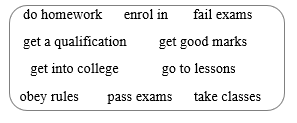Tiếng Anh 8 Unit 6 Vocabulary: Schools and examsTHINK! What are the best and worst things about going to school? 1. Use the word school and the words in the box to make compound nouns. Listen and check. Which types of school can you see in the photos? 2. Check the meaning of the phrases in the box and complete the questionnaire. Listen and check. Then ask and answer the questions with a partner. 3. Watch or listen to three people talking about school and answer the questions. Tổng hợp đề thi học kì 2 lớp 8 tất cả các môn - Chân trời sáng tạo Toán - Văn - Anh - Khoa học tự nhiên
Lựa chọn câu để xem lời giải nhanh hơn
Think! I can express opinions by agreeing or disagreeing (Tôi có thể bày tỏ ý kiến bằng cách đồng ý hoặc không đồng ý) THINK! What are the best and worst things about going to school? (Những điều tốt nhất và tồi tệ nhất về việc đi học là gì?) Lời giải chi tiết: In my opinion, the best thing of going to school is that I can access to the knowledge. I believe that being properly educated is important in setting not only someone's mindset but also their world view. However, school bullying is the other side of the coin. Obviously, actions need to be taken to reduce the rate of school bullying in order to ensure that students have a healthy environment to develop. (Theo tôi, điều tuyệt vời nhất của việc được đến trường chính là tôi có thể tiếp cận được tri thức. Tôi tin rằng việc được giáo dục tử tế rất quan trọng trong việc hình thành không chỉ lối tư duy mà còn cả thế giới quan của một người nào đó. Tuy nhiên, nạn bắt nạt học đường chính là mặt trái của vấn đề. Rõ ràng là chúng ta cần hành động để giảm thiểu tình trạng này, đảm bảo rằng học sinh được phát triển trong một môi trường lành mạnh.) Bài 1 1. Use the word school and the words in the box to make compound nouns. Listen and check. Which types of school can you see in the photos? (Dùng từ school và các từ trong hộp để tạo danh từ ghép. Nghe và kiểm tra. Những loại trường bạn có thể nhìn thấy trong các bức ảnh?) example: boarding school
Lời giải chi tiết: boarding school: trường nội trú school holidays: các kỳ nghỉ học home-school (homeschooling): giáo dục tại gia school-leavers: người vừa mới rời ghế nhà trường mixed school: trường nam nữ đồng giáo / trường hai giới (trường có cả học sinh nam và nữ) primary school: trường tiểu học school rules: nội quy nhà trường secondary school: trường trung học single-sex school: trường đơn giới (trường chỉ dành cho học sinh nam hoặc học sinh nữ) school uniform: đồng phục trường học Types of school I can see in the photos: primary school, single-sex school and boarding school. (Các loại trường tôi có thể thấy trong ảnh: trường tiểu học, trường một giới tính và trường nội trú.) Bài 2 2. Check the meaning of the phrases in the box and complete the questionnaire. Listen and check. Then ask and answer the questions with a partner. (Kiểm tra nghĩa của các cụm từ trong hộp và hoàn thành bảng câu hỏi. Nghe và kiểm tra. Sau đó hỏi và trả lời các câu hỏi với một người bạn.)
Plan your ideal school! What is your ideal school like? Choose from these ideas. 1. Type of school What kind of school do you decide to 1........... yourself in? a Single-sex school b. Boarding school c. Mixed school d. Homeschooling 2. Subjects Traditional school subjects are a bit boring, so you want a school where you can take 2………. in: a. dance, theatre and singing. b. skateboarding. c. graffiti art. d. sailing. e. other (please tell us what!) 3. Timetable What hours do you choose to go to 3…………? a. from 8.30 a.m. to 3.30 p.m. b. from 9.00 a.m to 4.00 p.m. c. from 10.00 a.m to 2.00 p.m. d. A timetable? No, thanks. I go to lessons when I feel like it. 4. Study It's important to do 4………… How much would you do at your ideal school? a. 2-3 hours a day b. 4-5 hours a week c. More than ten hours a week d. Homework is so old-fashioned. We don't have it at my ideal school! 5. Rules What happens if you don't 5…….. rules at your school? a. You get extra homework. b. Nothing. c. You stay at home for a week. d. You spend your lunchtime in class. 6. School leavers You're finally in your last year. The most Important thing for you is to: a. 6..…..….. exams so you can get 7…..…… and find a job. b. not 8…………. exams. c. get 9………… and get 10……..… to study for your future career. d. enjoy your last year with your friends. Phương pháp giải: - do homework: làm bài tập về nhà - enrol in: ghi danh, kết nạp, tuyển vào - fail exams: trượt kỳ thi - get a qualification: nhận bằng cấp - get good marks: được điểm cao - get into college: vào đại học - go to lessons: vào tiết học - obey rules: tuân thủ quy tắc - pass exams: đỗ, vượt qua kỳ thi - take classes: tham gia lớp học Lời giải chi tiết:
Plan your ideal school! (Lên kế hoạch cho ngôi trường lý tưởng của bạn!) What is your ideal school like? Choose from these ideas. (Ngôi trường lý tưởng của bạn như thế nào? Chọn từ những ý tưởng này.) 1. Type of school: What kind of school do you decide to 1enrol yourself in? (Loại hình trường học: Bạn quyết định đăng ký vào trường nào?) a Single-sex school (trường học đơn giới tính) b. Boarding school (trường học nội trú) c. Mixed school (trường học hai giới tính) d. Homeschooling (trường học tại gia) 2. Subjects: Traditional school subjects are a bit boring, so you want a school where you can take 2classes in: (Môn học: Các môn học ở trường truyền thống hơi nhàm chán, vì vậy bạn muốn một ngôi trường nơi bạn có thể học lớp:) a. dance, theatre and singing. (khiêu vũ, sân khấu và ca hát.) b. skateboarding. (trượt ván.) c. graffiti art. (nghệ thuật vẽ tranh trên tường graffiti.) d. sailing. (trèo thuyền) e. other (please tell us what!) (khác (vui lòng cho chúng tôi biết nó là gì!)) 3. Timetable: What hours do you choose to go to 3lessons? (Thời khóa biểu: Bạn chọn tham gia tiết học vào khung giờ nào?) a. from 8.30 a.m. to 3.30 p.m. (từ 8:30 sáng đến 3:30 chiều.) b. from 9.00 a.m to 4.00 p.m. (từ 9 giờ sáng đến 4 giờ chiều.) c. from 10.00 a.m to 2.00 p.m. (từ 10 giờ sáng đến 2 giờ chiều.) d. A timetable? No, thanks. I go to lessons when I feel like it. (Thời khóa biểu? Không, cám ơn. Tôi đi học khi tôi cảm thấy thích.) 4. Study: It's important to do 4homework. How much would you do at your ideal school? (Học tập: Điều quan trọng là phải làm bài tập về nhà. Bạn sẽ làm bao nhiêu tại ngôi trường lý tưởng của mình?) a. 2-3 hours a day (2-3 giờ mỗi ngày) b. 4-5 hours a week (4-5 giờ một tuần) c. More than ten hours a week (Hơn mười giờ một tuần) d. Homework is so old-fashioned. We don't have it at my ideal school! (Bài tập về nhà đã quá lỗi thời. Chúng tôi không có nó ở trường học lý tưởng của tôi!) 5. Rules: What happens if you don't 5obey rules at your school? (Nội quy: Điều gì xảy ra nếu bạn không tuân theo các quy tắc ở trường của bạn?) a. You get extra homework. (Bạn nhận được thêm bài tập về nhà.) b. Nothing. (Không có gì.) c. You stay at home for a week. (Bạn ở nhà trong một tuần.) d. You spend your lunchtime in class. (Bạn dành thời gian ăn trưa của bạn trong lớp học.) 6. School leavers: You're finally in your last year. The most Important thing for you is to: (Học sinh mới ra trường: Cuối cùng thì bạn cũng đang học năm cuối. Điều quan trọng nhất đối với bạn là:) a. 6 pass exams so you can get 7a qualification and find a job. (vượt qua các kỳ thi để bạn có thể nhận được bằng cấp và tìm được việc làm.) b. not 8 fail exams. (không thi rớt.) c. get 9good marks and get 10 into college to study for your future career. (đạt điểm cao và đỗ vào đại học để học tập cho nghề nghiệp tương lai của bạn.) d. enjoy your last year with your friends. (tận hưởng năm cuối cùng của bạn với bạn bè của bạn.) Bài 3 3. Watch or listen to three people talking about school and answer the questions. (Xem hoặc nghe ba người nói về trường học và trả lời các câu hỏi.) 1. What type of school does Emma prefer? (Emma thích loại trường nào hơn?) 2. What does Max say is more important than getting good results? (Max nói điều gì quan trọng hơn đạt được kết quả tốt?) 3. What is Elizabeth's opinion of homeschooling? (Ý kiến của Elizabeth về giáo dục tại nhà là gì?) KEY PHRASES Expressing opinions I definitely think that ......... I'm not sure I agree ……… It all depends on ……….. That's a good point. I like the idea of ……….. Phương pháp giải: Bài nghe: I = Interviewer, E = Emma, M = Max, EL = Elizabeth 1. Emma I What kind of school do you think is best for teenagers, Emma? E I definitely think that single-sex schools are the best, because in the UK, students at single-sex schools usually get better exam results than students at mixed schools. 2. Max I Max, does the type of school you attend help you get good results? M I’m not sure I agree with that. It all depends on how hard you study. But schools need to be more about helping students to become good people. I feel that’s much more important than getting good results and obeying the rules about school uniform. 3. Elizabeth I Elizabeth, do you agree that schools need to help students to become good people, rather than just help them to do well academically? EL Yeah, I do and I think that’s a good point. Learning is much more than maths, history and geography, and doing your homework. Getting good results shouldn’t be the only thing people think about and if it is, people will cheat. I So, what kind of school do you want? EL Well, I think that many head teachers don’t really understand what young people today need. I like the idea of home schooling. And one of the advantages is that you don’t get distracted by noisy students. Tạm dịch: I = người phỏng vấn , E = Emma, M = Max, EL = Elizabeth 1. Emma I Bạn nghĩ loại trường học nào là tốt nhất cho thanh thiếu niên, Emma? E Tôi chắc chắn nghĩ rằng các trường đơn giới tính là tốt nhất, bởi vì ở Anh, học sinh ở các trường đơn giới tính thường đạt kết quả thi tốt hơn học sinh ở các trường hỗn hợp. 2. Max I Max, loại trường bạn đang theo học có giúp bạn đạt được kết quả tốt không? M Tôi không chắc mình đồng ý với điều đó. Tất cả phụ thuộc vào việc bạn học tập chăm chỉ như thế nào. Nhưng trường học cần quan tâm nhiều hơn đến việc giúp học sinh trở thành người tốt. Tôi cảm thấy điều đó quan trọng hơn nhiều so với việc đạt được kết quả tốt và tuân thủ các quy định về đồng phục học sinh. 3. Elizabeth I Elizabeth, bạn có đồng ý rằng trường học cần giúp học sinh trở thành người tốt, thay vì chỉ giúp các em học giỏi? EL Có, tôi biết và tôi nghĩ đó là một điểm tốt. Học tập không chỉ dừng lại ở môn toán, lịch sử, địa lý và làm bài tập về nhà. Đạt được kết quả tốt không phải là điều duy nhất mọi người nghĩ đến và nếu đúng như vậy, mọi người sẽ gian lận. I Vậy, bạn muốn học loại trường nào? EL À, tôi nghĩ rằng nhiều hiệu trưởng chưa thực sự hiểu giới trẻ ngày nay cần gì. Tôi thích ý tưởng dạy học tại nhà. Và một trong những lợi ích là bạn không bị phân tâm bởi những học sinh ồn ào khác. Lời giải chi tiết: 1. What type of school does Emma prefer? (Emma thích loại trường nào hơn?) She prefers single-sex schools. (Cô ấy thích những trường đơn giới tính hơn.) Thông tin: E I definitely think that single-sex schools are the best... (Tôi chắc chắn nghĩ rằng những trường đơn giới tính là tốt nhất...) 2. What does Max say is more important than getting good results? (Max nói điều gì quan trọng hơn đạt được kết quả tốt?) Helping students becomg good people. (Giúp học sinh trở thành người tốt.) Thông tin: M But schools need to be more about helping students to become good people. (Nhưng các trường học cần quan tâm hơn đến việc giúp học sinh trở thành người tốt.) 3. What is Elizabeth's opinion of homeschooling? (Ý kiến của Elizabeth về giáo dục tại nhà là gì?) She thinks it’s good because you don’t get distracted by noisy students. (Cô ấy nghĩ nó tốt vởi vì bạn sẽ không bị làm phân tâm bởi những học sinh ồn ào.) Thông tin: EL I like the idea of home schooling. And one of the advantages is that you don’t get distracted by noisy students. (Tôi thích ý tưởng học tại nhà. Và một trong những ưu điểm chính là bạn sẽ không bị làm phân tâm bởi những học sinh ổn ào.) Bài 4 4. USE IT! Work in pairs. Give your opinions on these statements using the key phrases. (Làm việc theo cặp. Đưa ra ý kiến của bạn về những tuyên bố này bằng cách sử dụng các cụm từ khóa.) Age of school-leavers to increase to 19 All secondary schools will have uniforms by September SCHOOL HOLIDAYS WILL BE REDUCED TO THREE WEEKS IN SUMMER All schools will become single-sex schools A: Some people aren't interested in doing exams and going to college, so I definitely think that changing the school-leaving age to nineteen is a mistake. B: That's a good point. Finished? Finished? Use the key phrases to tell a partner about your ideal school. (Sử dụng các cụm từ chính để nói với đối tác về ngôi trường lý tưởng của bạn.)
|






















